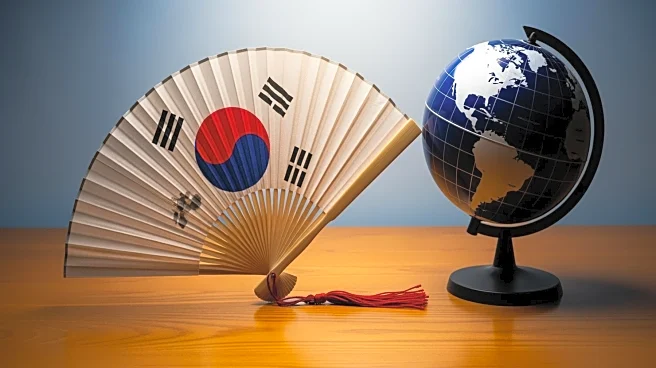What's Happening?
South Korea is navigating complex geopolitical dynamics as tensions between the U.S. and China continue to escalate. The recent Asia-Pacific Economic Cooperation (APEC) summit highlighted these challenges, with South Korea's President Lee Jae Myung advocating
for multilateral cooperation despite differing values among member countries. Historically, South Korea's relationship with China has been strained since 2016, following its decision to host the U.S. missile defense system THAAD, which led to Chinese economic retaliations. Currently, South Korea is balancing its economic ties with China and its security alliance with the U.S. The recent tariff agreement between Washington and Seoul, which includes a significant South Korean investment in the U.S., underscores this shift. Meanwhile, South Korea's economic rivalry with China is intensifying, particularly in technology sectors like electric vehicles and electronics.
Why It's Important?
The geopolitical tension between the U.S. and China places South Korea in a challenging position, affecting its economic and security policies. As South Korea strengthens its economic ties with the U.S., it risks further straining its relationship with China, its largest trading partner. This shift could have significant implications for South Korea's economy, particularly if Chinese retaliatory measures intensify. Additionally, the growing technological rivalry with China could impact South Korean industries, potentially leading to increased competition and market shifts. The situation also highlights the broader regional implications of U.S.-China tensions, as countries like South Korea must navigate complex alliances and economic dependencies.
What's Next?
South Korea is likely to continue strengthening its economic and security ties with the U.S., potentially leading to further economic agreements and collaborations. However, this may provoke additional responses from China, which could include economic sanctions or diplomatic pressures. The ongoing U.S.-China trade dispute remains a critical factor, as its resolution could influence South Korea's strategic decisions. Additionally, South Korea may seek to diversify its economic partnerships to mitigate risks associated with its reliance on China and the U.S.
Beyond the Headlines
The situation underscores the ethical and cultural tensions within South Korea, as public sentiment towards China becomes increasingly negative. This shift is particularly evident among younger generations, who have participated in anti-China rallies. The evolving geopolitical landscape may also prompt South Korea to reassess its national identity and foreign policy priorities, balancing economic growth with security concerns.
















